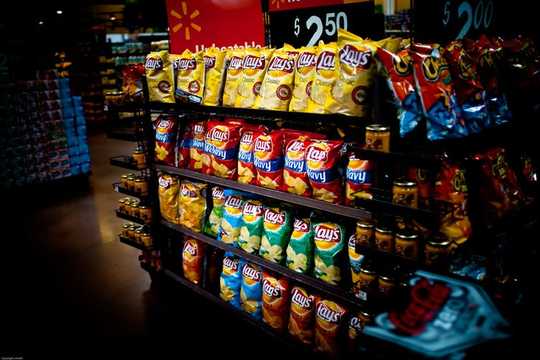
Almost half of Melbourne supermarkets’ end-of-aisle displays promote junk food. Flickr/Vox Efx
Supermarkets are an essential part of modern living – open almost all the time, selling almost everything, and selling it cheap.
Nowhere is this more true than in Australia. Coles and Woolworths, our two most dominant supermarket chains, are now ranked among the top 20 biggest retailers in the world.
Almost two-thirds of the groceries purchased in Australia are bought from these two stores. The supermarket environment is now a key influence on Australian diets. Unfortunately, the evidence suggests Big Supermarket has an unhealthy habit of promoting Big Junk – soft drinks, chocolate, confectionery and chips.
In a recent Melbourne study, four out of every 10 end-of-aisle displays and every single checkout measured were found to promote these products.
Other research has shown that the promotion of junk food in Australian supermarkets is greatest in disadvantaged suburbs – precisely the areas where obesity is more common.
And compared with supermarkets from seven other countries – the US, Canada, Denmark, Sweden, Netherlands, UK and New Zealand – Australian supermarkets have been shown to be world leaders in the promotion of junk food at checkouts and end-of-aisle displays.
Consumer choice? Or super profits?
While the supermarkets will defend these statistics by telling us that their customers demand and deserve choice, the wholesale promotion of products that we should be eating “sometimes and in small amounts” has nothing to do with choice.
The motive driving supermarkets’ promotion of Big Junk? Big profits.
Sales figures guide most decisions in retail. The bottom line of a supermarket chain benefits from the promotion of junk food through both increased sales, and from the fees paid by manufacturers in exchange for a prime positioning on shelves.
But in this case, what is good for the supermarket is bad for the consumer.
Margaret Chan, the director general of the World Health Organization, highlighted the impact of junk food profiteering in a recent speech:
Efforts to prevent non-communicable [lifestyle] diseases go against the business interests of powerful economic operators … In my view, this is one of the biggest challenges facing health promotion … It is not just Big Tobacco anymore. Public health must also contend with Big Food, Big Soda, and Big Alcohol.

Would the threat of regulation make supermarkets think twice about their promotion of junk food? Flickr/macattck
With 63% of Australians now overweight or obese, and diabetes rates rising as a consequence, the question then becomes: how do public health interests compete with those of such powerful businesses?
There are two major levers that large corporations seem to respond to: the threat of regulation, and negative public perception that may impact sales. Both are potential targets that could be used to “nudge” Big Supermarket toward healthier environments.
The threat of regulation has only recently seen Coles and Woolworths act to protect suppliers. It isn’t a stretch to imagine they might act similarly in response to the prospect of regulation aimed at reducing Australia’s rate of obesity.
And in the Australian context of a highly competitive duopoly, public perception is particularly important to both Coles and Woolworths. Public perception can be influenced by effective advocates – individuals, the media or organisations such as the Parent’s Jury, the Obesity Policy Coalition and Sustain, in the UK.
The supermarkets also attempt to drive public perception themselves, with Woolworths launching its excellent healthy lunchbox range in recognition of the consumer demand for healthier options and in an attempt to position themselves as “the supermarket that inspires a healthier Australia”.
The fact that supermarkets are now using their health credentials as a marketing tool is surely a sign of change in the right direction.
As consumers become more aware of the importance of a healthy diet, will supermarkets realise restricting the promotion of Big Junk may even be good for business?
By concentrating on what motivates Big Supermarket, we may help nudge them into action – and begin to reverse our seemingly intractable obesity epidemic.![]()
About the Author
Adrian Cameron, Researcher, Deakin University
Nutrition books on from Amazon's Best Sellers list
"The Blue Zones Kitchen: 100 Recipes to Live to 100"
by Dan Buettner
In this book, author Dan Buettner shares recipes from the world's "Blue Zones," regions where people live the longest and healthiest lives. The recipes are based on whole, unprocessed foods and emphasize vegetables, legumes, and whole grains. The book also includes tips for following a plant-based diet and living a healthy lifestyle.
Click for more info or to order
"Medical Medium Cleanse to Heal: Healing Plans for Sufferers of Anxiety, Depression, Acne, Eczema, Lyme, Gut Problems, Brain Fog, Weight Issues, Migraines, Bloating, Vertigo, Psoriasis, Cys"
by Anthony William
In this book, author Anthony William offers a comprehensive guide to cleansing and healing the body through nutrition. He provides evidence-based recommendations for foods to include and avoid, as well as meal plans and recipes to support the cleanse. The book also includes information on how to address specific health concerns through nutrition.
Click for more info or to order
"The Forks Over Knives Plan: How to Transition to the Life-Saving, Whole-Food, Plant-Based Diet"
by Alona Pulde and Matthew Lederman
In this book, authors Alona Pulde and Matthew Lederman offer a step-by-step guide to transitioning to a whole-food, plant-based diet. They provide evidence-based recommendations for nutrition, along with practical advice for shopping, meal planning, and preparation. The book also includes recipes and meal plans to support the transition.
Click for more info or to order
"The Plant Paradox: The Hidden Dangers in 'Healthy' Foods That Cause Disease and Weight Gain"
by Dr. Steven R. Gundry
In this book, Dr. Steven R. Gundry provides a controversial perspective on nutrition, arguing that many so-called "healthy" foods can actually be harmful to the body. He provides evidence-based recommendations for optimizing nutrition and avoiding these hidden dangers. The book also includes recipes and meal plans to help readers implement the Plant Paradox program.
Click for more info or to order
"The Whole30: The 30-Day Guide to Total Health and Food Freedom"
by Melissa Hartwig Urban and Dallas Hartwig
In this book, authors Melissa Hartwig Urban and Dallas Hartwig offer a comprehensive guide to the Whole30 program, a 30-day nutrition plan designed to promote health and wellness. The book provides information on the science behind the program, as well as practical advice for shopping, meal planning, and preparation. The book also includes recipes and meal plans to support the program.
Click for more info or to order
This article is republished from The Conversation under a Creative Commons license. Read the original article.






















